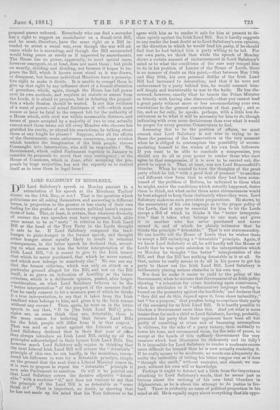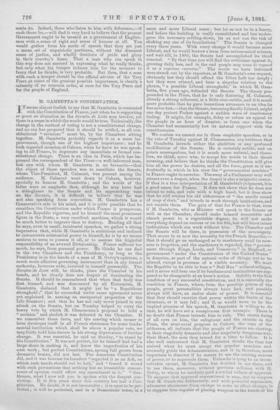LORD SALISBURY IN MIDDLESEX.
DID Lord Salisbury's speech on Monday amount to a retractation of his speech at the Merchant Taylors' dinner on the 19th May, or not ? That is the question which politicians are all asking themselves, and answering in different terms, in proportion to the greater or loss nicety of their own feeling for the grades of an inveterate political hater's expres- aions of hate. This, at least, is certain, that whatever diversity of nuance the two speeches may have expressed, both alike were meant to be as "nasty " in relation to the Irish Land Bill as the head of the Tory Party in the Lords thought it safe to be. If Lord Salisbury compared the land- hunger to plate-hunger in the former speech, and thought either hunger about equally likely to result in criminal consequences, in the latter speech he declared that, accord- ing to what seems to him the bettor interpretation of the Irish Land Bill, " it is meant to give to the Irish tenant that which he never purchased, that which ho never earned, and which now belongs to somebody else." No one can say that the former criticism, which was only an attack on a particular ground alleged for the Bill, and not on the Bill itself, is so grave an indication of hostility as the latter criticism, which is a deliberate opinion, passed, after longer consideration, on what Lord Salisbury believes to be the " better interpretation " of the purport of the measure itself. Can he easily consent to let a measure pass of which he thinks it a true interpretation, to say that it takes from the Irish landlord what belongs to him, and gives it to the Irish tenant without any excuse ? Then, again, he went on in the latter speech to say that, "If its [the Irish Land Bill's] prin- ciples are, as some think they are, detestable, there is the more reason for believing that future i_and Bills for the Irish people will differ from it in' that respect." That was said as a taunt against the Liberals of whom Lord Salisbury declared that in their first year of oNce they always introduce an Irish Land Bill, eating up all the Principles acknowledged in their former Irish Land Bills. But however much Lord Salisbury may rejoice in thinking that the next Liberal Irish Land Bill will reverse the " detestable " principle of this one, he can hardly, in the meantime, recom- mend his followers to vote for a detestable principle, simply on the ground that the next time a Liberal Ministry comes in, it is sure to propose to repeal the " detestable " principle it now asks Parliament to sanction. Or will it be pointed out that Lord Salisbury covers the decisive adjective " detest- able " with a cautious " if," and does not venture to say that the principle of the Land Bill is as detestable as " some think it V' That is important, no doubt, as showing that he has not made up his mind that his Tory followers so far agree with him as to render it safe for him at present to de- clare openly against the Irish Land Bill. But it hardly suggests to aey reader the least doubt as to Lord Salisbury's own opinion, or the direction in which he would lead his party, if he should find that be had behind him a party willing to be led. For our own parts, we think that while the speech of Monday shows a certain amount of embarrassment in Lord Salisbury's mind as to what the conditions of the case may compel him to do in his position of Leader of the House of Lords, there is no manner of doubt on this point,—that between May 19th and May 30th, his own personal dislike of the Irish Land Bill had increased to detestation, and that if he were not embarrassed by a party behind him, he would commit him- self deeply and irretrievably to war to the knife. He has dis- covered, however, exactly what he taunts the Prime Minister so bitterly with having also discovered,—that you cannot lead a great party without more or less accommodating your own convictions to the general convictions of that party ; mad so far, and eo far only, he speaks, perhaps, with a little less dee cisiveness as to what it will be necessary for him to do, though indicating with even more decisiveness than ever what it would be proper for every genuine Conservative to feel,
Assuming this to be the position of affairs, we must remark that Lord Salisbury is not wise in trying to in- flame the passions of the Conservatives at the very moment when he is obliged to contemplate the possibility of accom- modating himself to the wishes of his own Irish followers. If you want to be able to conclude a compromise, you should not do all in your power to render those who must agree to that compromise, if it is ever to be carried out, dis- posed to reject it. That, at least, was not Lord Beaconsfield's blunder. When he wanted to turn the thoughts of the great party which he led," with a good deal of pressure " to another and different view from that to which they had been accus- tomed of the problem of Reform, ho indicated to them what he might, under the conditions which actually happened, desire them to think, not what under those same circumstances would be best adapted to keep them obstinately where they were. Lord Salisbury makes no such provident preparations. He shows, by the uncertainty of his own language as to the proper policy of the Lords, that it may be essential for him to let the Lords accept a Bill of which he thinks it the "better interpreta- tion" that it takes what belongs to one man, and gives it to another who has never purchased and never earned it, and of which he plainly intimates that he thinks the principle " detestable." That is not statesmanship. He can hardly tell the House of Lords that he wishes them to accept a Bill embodying a " detestable " principle. Again, if we know Lord Salisbury at all, he will hardly tell the House of Lords that he was quite mistaken in the interpretation which on Monday he thought " the better " interpretation of the Bill, and that the Bill has nothing detestable in it at all. Sb that, unless he really means to do all in his power to get his party to throw out the Irish Land Bill, Lord Salisbury is deliberately placing serious obstacles in his own way.
Nor does he make it easier to yield to the policy of the Government, when he accuses that Government of an Irish policy showing " a toleration for crime bordering upon connivance," when ho attributes to it " inflammatory language tending to hound on the peasantry against the landlords," and declares that " they did not do this, depend upon it, from sheer imbecility," but " for a purpose," that purpnee being to convince their party of the necessity for an Irish Land Bill. It is hardly possible to blacken a Government more than this. And yet what is more insane than for such a chief as Lord Salisbury, having, probably, persuaded his party that their opponents have been all but guilty of conniving at crime and of becoming accomplices in violence, for the sake of a party victory, then suddenly to lower his tone, and recommend them, for the sake of peace, to accept at the hands of this ruffianly Government the very measure which best illustrates its dishonesty and its folly V It is impossible for Lord Salisbury to render a moderate course more difficult for himself than he is now actually rendering it. If he really means to be moderate, no words can adequately de- scribe the imbecility of letting his bitter tongue run as it does " through the earth," without restraint, and almost, we sus- pect, without his own will or knowledge. Perhaps it ought to detract not a little from the importance attaching to Lord Salisbury's words, that he seems just as furious about the undoing of his own fatal blunders in Afghanistan, as he is about the attempt to do justice in Ire- land. There is evidently no sense of political proportion in his mind at all. He is equally angry about everything that his oppo- nents do. Indeed, those who listen to him with deference,—if such there be,—will find it very hard to believe that the present Government ought to be treated as a government of English- men with a sense of right and sense of honour at all. You would gather from his mode of speech that they are just a mean set of unpatriotic partisans, without the dimmest sense of justice, and wholly destitute of pride and glory in their country's fame. That a man who can speak in this way does not succeed in expressing what he really thinks, but only what his temper induces him for the moment to fancy that he thinks, is very probable. But then, that a man with such a temper should be the official adviser of the Tory Peers at crises of the greatest possible importance, is clearly a calamity of no common order, at once for the Tory Peers and for the people of England.



































 Previous page
Previous page